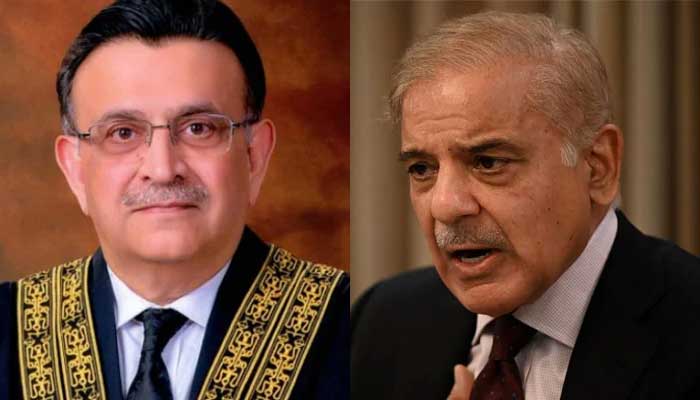By Staff Reporter
ISLAMABAD: An eight-judge bench headed by the Chief Justice of Pakistan is set to hear three petitions on Thursday that challenge a proposed legislation aimed at limiting the authority of the country’s top judge.
However, the move has faced opposition from both the ruling alliance and the legal community. They argue that the Supreme Court should not consider petitions against a law that has yet to be passed.
The coalition government of Prime Minister Shehbaz Sharif has rejected the formation of an eight-member bench of the Supreme Court, saying it has “never been seen before in the history of Pakistan’s highest court and risks undermining its credibility”.
The ruling parties have described the bench as a “testament to the division of the SC,” citing previous objections by Justices Isa and Khan to “biased and dictatorial behavior” and the formation of special benches.
The coalition government expressed further concern regarding the non-inclusion of judges from smaller provinces, including Balochistan and Khyber Pakhtunkhwa (KP).
The Pakistan Bar Council (PBC) called for a nationwide boycott of courts on Thursday, citing concerns over the composition of the bench, which it describes as “one-sided and controversial”.
The PBC has also expressed strong reservations about the selection of judges for this bench, which it believes is an attempt to regulate the discretionary powers of the Chief Justice.
The bench, which comprises of Justice Ijaz-ul-Ahsan, Justice Munib Akhtar, Justice Sayyed Mazahar Ali Akbar Naqvi, Justice Mohammad Ali Mazhar, Justice Ayesha A. Malik, Justice Syed Hasan Azhar Rizvi, and Justice Shahid Waheed, has been criticized for not including the two senior-most judges, namely Justice Qazi Faez Isa and Justice Sardar Tariq Masood, in larger bench hearings of politically sensitive cases. The PBC has announced a complete strike and boycott of court proceedings throughout the country in protest the SC hearing.
PBC Executive Committee Chairman Hasan Raza Pasha has noted that the legislation for regulating the Chief Justice’s powers was carried out on the bar’s demand. Even Hamid Khan, the head of the Professional Group, has called for an end to the perception that only “like-minded” judges are included in a larger bench.
Meanwhile, PBC member Amjad Shah has warned that the Supreme Court will be responsible if the parliamentary system in the country derails, as he believes that this is not an issue of the rule of law but a “war for supremacy” where everything is fair to achieve the desired objective.
Advocate Mirza Moiz Baig has raised concerns about the Chief Justice’s “unfettered” powers to constitute benches and has warned that excluding senior judges from the bench will only accentuate the divide within the top court.
Baig has also pointed out that Article IV of the judges’ code of conduct restrains them from acting in a matter that involves their own interest, and therefore judges who are not expected to serve as Chief Justice during their tenures should hear the challenge to the bill.
The eight-member bench will consider the petitions challenging the SC (Practice & Procedure) Bill, 2023, which President Arif Alvi has already returned once after it was passed by both houses of parliament, and it was again passed by a joint session of parliament.
The latest petitions argue that the concept, preparation, endorsement and passing of the Supreme Court (Practice and Procedure) Bill, 2023 is an act tainted with mala fide. Therefore, petitions urge the SC to strike it down after declaring it to be without lawful authority and of no legal effect.
The controversial bill was passed by the National Assembly on March 29, after being approved by the cabinet a day earlier. It was then passed by the Senate on March 30 and referred to the president for his approval. However, the president returned it, citing concerns over its validity, in accordance with the Constitution.
The bill was passed by parliament’s joint session again on Monday, with a few amendments.
Under the new legislation, a three-member bench consisting of the CJP and the two senior-most judges of the apex court will decide whether or not to take up a matter suo motu, which was previously solely the prerogative of the CJP.
The law also states that every cause, matter, or appeal before the apex court would be heard and disposed of by a bench constituted by a committee made up of the chief justice and the two senior-most judges.
The legislation also includes the right to file an appeal within 30 days of the judgment in a suo motu case and that any case involving constitutional interpretation will not have a bench of fewer than five judges.
The bill would also allow former prime minister Nawaz Sharif and other parliamentarians disqualified by the Supreme Court under suo motu powers, such as Jahangir Tareen, to appeal their disqualification within 30 days of the law’s enactment.
The president now has ten days to sign the bill into law, after which it will be deemed to have been granted assent if he fails to do so.
Copyright © 2021 Independent Pakistan | All rights reserved




